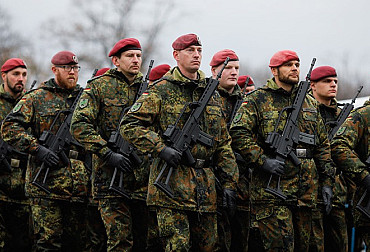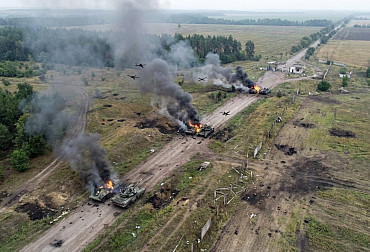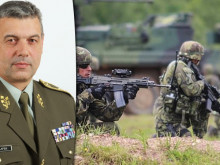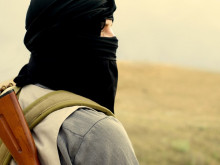Pavel Smutný: We buy Israeli weapons because of quality, not political pressure
Pavel Smutný is a Czech lawyer and attorney, one of the founders of the law firm Císař, Češka, Smutný, and a cultural patron who helped organize, for example, a collection for a new organ in St. Vitus Cathedral. He is also well known for his work in the Czech-Israeli Joint Chamber of Commerce (ČISOK), of which he has been the president continuously since 2009. In view of this fact, he is considered one of the leading Czech experts on Czech-Israeli relations and on the State of Israel itself, including its security. It is not without interest that Tomáš Pojar, national security advisor and former Czech ambassador to Israel, is also a long-standing member of the Chamber. Pavel Smutný gave an interview to CZ DEFENCE in which we discuss Israel's security situation and its strategic relations with the Czech Republic.
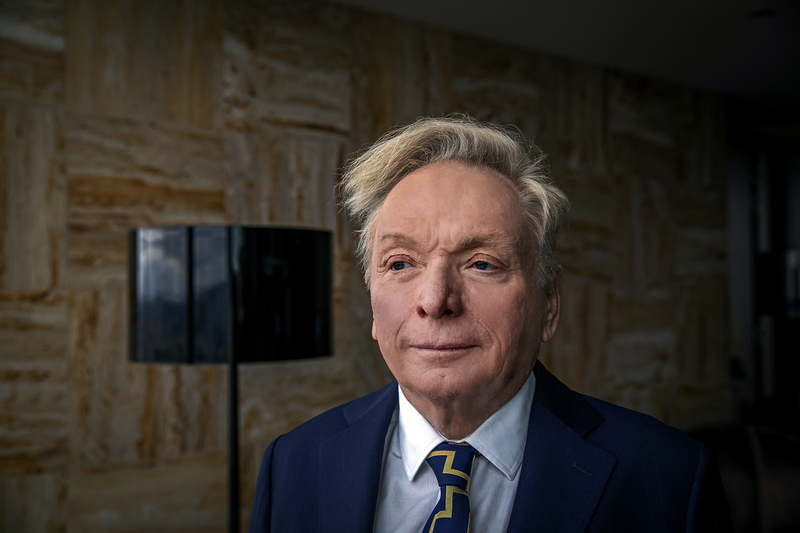 Picture: JUDr. Pavel Smutný is considered one of the leading Czech experts on Czech-Israeli relations and the State of Israel itself, including its security. | Jan Mudra
Picture: JUDr. Pavel Smutný is considered one of the leading Czech experts on Czech-Israeli relations and the State of Israel itself, including its security. | Jan Mudra
Pavel Smutný and Israel: How did the story actually begin?
In 1996, I took part in a trip to Israel alongside the then Minister of Industry and Trade Miroslav Gregor. Miroslav intuitively recognized the enormous potential that cooperation between the two countries had and basically gave me the task to establish the Czech-Israeli Chamber at that time, five years after the restoration of diplomatic relations between the Czech Republic and Israel. I soon understood that Israel could become my second country next to the Czech Republic. And that is what happened.
How has Israel changed since you met it?
Fundamentally, much like the Czech Republic. In fact, both countries have a similar story. In the mid-1990s, Israel began to reap the fruits of its strong political orientation towards technology and the start-up system. At that time, the country already had a chief scientist system in place, and the whole structure of the state was geared towards supporting research, development and new technologies.
In this context, it is worth recalling that Israel was not always the economic tiger we perceive it to be today...
Israel in the 1990s followed a rather tumultuous period in the 1980s when it suffered from high inflation, an unstable currency, and a country that was no different emotionally and visually from its neighbors. Just as we were in a communist grey area from which we gradually broke away, so Israel broke away from the regional standard and became a technological and ideological leader. Today it is undoubtedly a technological power with primacy in a number of fields. Several hundred Israeli companies are listed on American stock exchanges. We go there to learn, quite successfully lately, how to adopt a start-up culture and a certain courage to do business in sophisticated fields. The Czechs have a good aptitude for this.
It is also worth adding to the context that Israel has the potential to become a major raw materials power.
Yes. A few years ago, Israel discovered extremely rich deposits of natural gas in its territorial waters. Surprisingly, it has not reacted with much jubilation, but rather fears that its technological and intellectual efforts will be undermined. They are wondering how to invest the money they will get from future production in a meaningful way.
How has the Israeli relationship with the Czechs changed since the 1990s?
From the perception of the Czech Republic as a post-communist country, the view of the high industrial maturity of the Czech Republic and the extremely friendly relationship of the Czechs to the Jews has taken hold in Israel. Israel appreciates our moral support and also sees us as a country of culture and education.
Can any parallels be drawn between the Czech Republic and Israel in political development?
It is an interesting comparison. In Israel, there are currently large demonstrations against the new government, which is very controversial. Similarly to the Czech Republic, we see that in Israel the election results are narrowly split down the middle. Several elections have had to be held there because of the ambiguity of the results. The country is at a significant crossroads, and it is being decided whether the country will move in a conservative and sharp direction or in a liberal-left direction. This dispute is gripping the whole democratic world and, in a way, it is also working here.
In Israel, the specific case of the independence and status of judges is also reflected in this. In fairness, it must be said that it is not nearly as clear-cut as it is presented. The position of judge is quite exceptional in the Jewish religion and state system. In the Old Testament, the judge is appointed before the priest, which the Israeli judges attempted to build upon. They have created an abnormal situation where the Supreme Court wants to become a political arbiter, which is the same excess as suppressing the independence of the judiciary. The dispute is not one of a single colour.
You recently became the first Czech to receive the Jerusalem Award, which is given by the City of Jerusalem together with the World Zionist Organization. Why you?
I was surprised and honored. The Israelis have been saving the awards and historically reserved them for those who saved Jews from the Holocaust. In some countries, it's a risky business for the recipient of the award. I am proud to be the first Czech to receive it. It is a confirmation that the Chamber's activities and efforts are beneficial, which we are committed to continue. Indeed, the Czech-Israeli Joint Chamber of Commerce has long been rated as the best bilateral chamber of commerce in the world. We have an excellent track record. We take our inspiration from the American organisation IPAC, which has a mass membership in the US and is the official pro-Israel lobby. We are not just business and industry oriented. We focus on the overall concept of relations with Israel and we benefit from the fact that the mood of Czech society towards Israel is predominantly positive. The sharpening of security issues at the moment means that it tends to favour Israel on issues such as defending its own security and identity. This forms a solid basis for the further development of the exceptional Czech-Israeli relations, which are of practical and assessable importance for the Czech Republic.
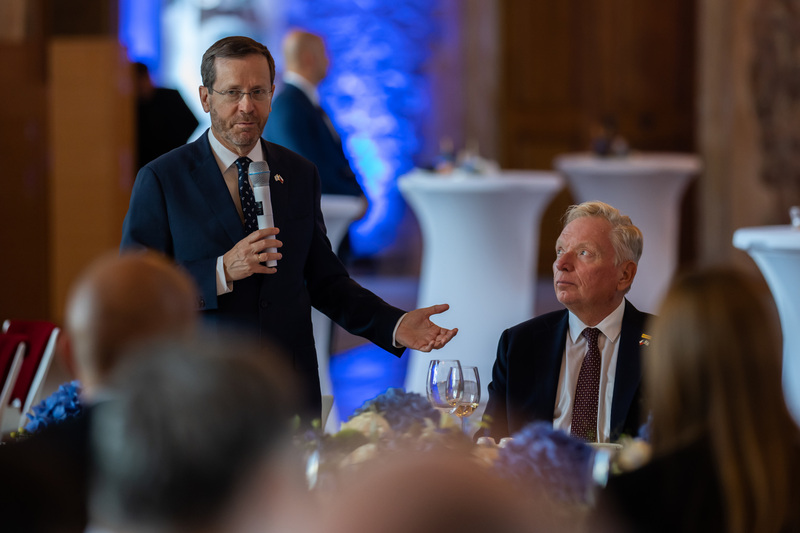 Picture: Pavel Smutný with Israeli President Isaac Herzog | ČISOK
Picture: Pavel Smutný with Israeli President Isaac Herzog | ČISOK
What is the main mission of ČISOK?
First and foremost, it is the promotion of trade relations between the Czech Republic and Israel. It is a very complex chapter, because it is not about the classic search for business opportunities (that is done differently), but about creating a modern platform for communication and cooperation.
Those who can do business in Israel can do business all over the world. Israel is a tough market. Jews are tough but fair partners, every deal must make sense, the terms must be favorable and standard. Czech companies are not always able to meet these criteria. There is plenty of room for improvement, we still have many unfulfilled tasks.
The trade balance is normally a surplus for the Czech Republic, we export more to Israel than we import from it, but a big part of this is played by the damage caused by the cars. We believe that the participation of Czech companies in infrastructure and environmental projects that address drought and water supply in third countries can be developed.
So you don't interfere in politics?
There is also a political and social dimension. The Chamber is an umbrella organisation for various activities in the field of promotion of Israel. I will mention, for example, the Cemach project, through which we try to introduce modern Israel to the younger generation. On some fundamental issues, we speak out on selected political issues, such as the boycott of goods from the Palestinian territories or the transfer of our embassy from Tel Aviv to Jerusalem. This is a very important matter and the current government is in favour of it.
What about science and research?
That is a very important part of our work. The chamber's members are companies with high-tech potential and added value; it is an elite club with elite scientists and scientific institutions. The chamber has a concentration of several exceptional Czech personalities from the fields of medicine, IT and environmental protection. We organise expert missions to Israel in the field of medicine, cyber security, agriculture or ecology, and really important capacities from the Czech Republic participate in them. I will also mention the support for cultural activities. This year, for the 11th time, we are awarding the Arnošt Lustig Prize, which has acquired the status of a Czech moral prize.
When did you first become aware of the strong role of the army and belonging to it in Israel?
This is something that one absolutely cannot overlook. The fact that Israel is in a permanent state of emergency brings a number of negatives, but I must say, it is my personal opinion, that it also brings some positives: a clear value orientation for the entire nation and the enormous prestige of the Israeli army, which it has to fight for in its daily activities. With this comes military basic service for both men and women, which involves not only training but also combat deployment and real danger. Indeed, many of my Israeli friends have injuries from combat operations. The importance of the army can be seen in civilian life as well: those who successfully make a career in the army are considered to be versatile senior managers. I meet military personalities in the management of many private corporations and institutions. Cadres from the military have an open door to the whole economy. They are often very competent and impressive people.
How does the topic of defence and security affect the work of ČISOK?
The vice-president of ČISOK is Tomáš Pojar, our former ambassador to Israel and a key figure in Czech security policy. Then there is a group of members of the Czech defence industry, and I must also say that ČISOK also brings together those sympathetic to Israel who represent the military.
Israel faces external threats, but also internal threats. Let us start with the Israeli-Palestinian conflict. Do you see a solution on the horizon?
My estimates are skeptical and I see a solution on the horizon of many decades. Much has been invested in the Palestinians' hatred of Israelis, through education from childhood. I see the solution elsewhere: by continuing to grow both economically and technologically, Israel will try to put itself in a de facto dominant position in terms of helping its Arab neighbours, whether on water, agriculture or even gas supplies. I am not saying that Israel will buy peace, but it has more and more to offer in return.
Is the result of this strategy already visible in practice?
This is evident, for example, in the agreements with the UAE and the perceptible turnaround of parts of the Muslim world in recent years. I have long heard from senior Israelis that Israel will not focus on negotiating with the Palestinians, but on the key powers in the region that are capable of not only stirring up the Palestinian problem but also extinguishing it, unlike the EU, which is not. Israel's growing authority and deft foreign policy is weakening the acute hostility, with the exception of Iran, but even it no longer declares the destruction of Israel a top priority. There is a trend towards improvement and it will impact on the Palestinian problem. In a ten-year perspective, its importance will decline.
Is it not one-sided to point out the hatred of Palestinians for Israelis without mentioning how it is on the other side?
There is no anti-Palestinian feeling in Israel, I want to stress that, there is no reciprocal hatred. The Arabs are Israeli citizens, there are great Palestinian restaurants and there are preconditions for cultural rapprochement. Young Israelis are worried about the situation and are looking for a way to reach out to the Palestinian Arabs. It's not nearly as hopeless as it looks through the lens of the media.
How much of a threat is the Hamas movement controlling the Gaza Strip?
I do not foresee further escalation, and the Israelis have been able to find an appropriate response to every Hamas threat. In response to the gradual departure of Mahmoud Abbas, we see a certain interregnum on the Palestinian political scene. Hamas is dangerous as a politico-military organisation, it gives backbone and political cover to terrorist attacks, but it does not bring anything new.
Iran and the potential of the nuclear threat: does Israel fear this threat too much or not enough?
The nuclear threat was much exalted and intense at one time, but today Iran is dealing with significant internal problems and is embroiled in the Russia-Ukraine conflict. It will have to take more care and behave more attentively towards Israel.
Let us turn to Israel's internal problems.
They are considerable. Israel is a miniature United States, a melting pot, with Jews coming in from all over the world, from Morocco, India, Europe, the US, South America and, unfortunately, from Eastern Europe and Russia, which are not safe for Jews. This brings a number of problems. Even if the unifying element in Israel is Hebrew language, religion and ethnicity, this alone cannot ensure unity. There is growing tension between the Orthodox community, which is growing in population, and liberal society. This is one of the problems of this government, which includes Orthodox Jews not recognizing the Israeli state. Democracy has a hard time handling such pressures.
You have already mentioned that the EU is not helping the situation in Israel...
Counting advice, especially from Europe, is bordering on the ridiculous. The hypocritical policies of some European states towards Israel are increasingly influenced by the Arab minorities in those countries. I would like the Czech Republic to find its own way. If we combine our positive attitude towards Israel with the EU's approach, we will achieve nothing.
What prominent IDF leaders have you met and what impression did they leave on you?
I met Moshe Jalon, former Chief of Staff and Minister of Defense. Jalon is an imposing figure, very committed to peace, but at the same time very skeptical. I adopted many of his views. Another figure of the same calibre is Dan Meridor, former Deputy Prime Minister for Security and Security Services. I run into a number of prominent retired Israeli generals in Teva or other companies where they work in management. That military esprit de corps is a definite plus for Israel.
Should we adopt the Israeli approach to security in the Czech Republic?
As covid and other threats have shown, we need to get into a position of some autonomy as a country and as individuals and families, for example in the event of a short-term black-out or intense drought. Israel is teaching us a sophisticated approach. The underground car park of a supermarket in Haifa served as a shelter and even a school for children during the shelling from Gaza. This is an example of the flexible response and practicality that we share with the Israelis. Security must be seen in context: it includes not only the army, police and fire brigade, but also health, the environment, the level of politics and culture. Things need to be taken in context; solving individual problems is useless.
ČISOK is heavily involved in technology transfer in the water sector. Is it getting results?
I think ČISOK has been very instrumental in popularizing Israel as an inspiration for how to solve water problems. Israel has been a world leader in water technology and I feel that we have learned a lot from them and that we are getting there.
In the context of the security situation in Europe, there is some discussion about reintroducing compulsory military service. Do you think that if it is reinstated in the Czech Republic it could have similar positive effects as in Israel?
I am ambivalent on this question. My generation experienced compulsory basic military service to the fullest and it was not a good thing. Its abolition has both positives and clear negatives. We all feel the need to know how to defend our country. If compulsory military service worked differently to the way it has in the past, if it gave young people a healthy patriotism, skills and broadened their qualifications, I think it would be accepted by the majority of the public. But I am in no way trying to evoke the threat of war. I am not advocating declaring that the country is at war, and promoting alarmist policies. We shouldn't play with that fire.
The Czech Republic is dealing with major armament projects with Israel, let us take them one by one: Israel is supplying MADR radars, the Spyder air defence system and negotiations are underway on HERON drones. How did ČISOK get involved in the negotiations of these projects and how do you evaluate them?
When we are asked, we get involved in terms of general support, we do not interfere in any way with the deals themselves. In general, I am happy if the Czech Republic buys the best defence technologies, and these are undoubtedly Israeli ones. But there is another advantage: What we buy from Israel is not subject to any political pressure. We buy from them because the product is great.
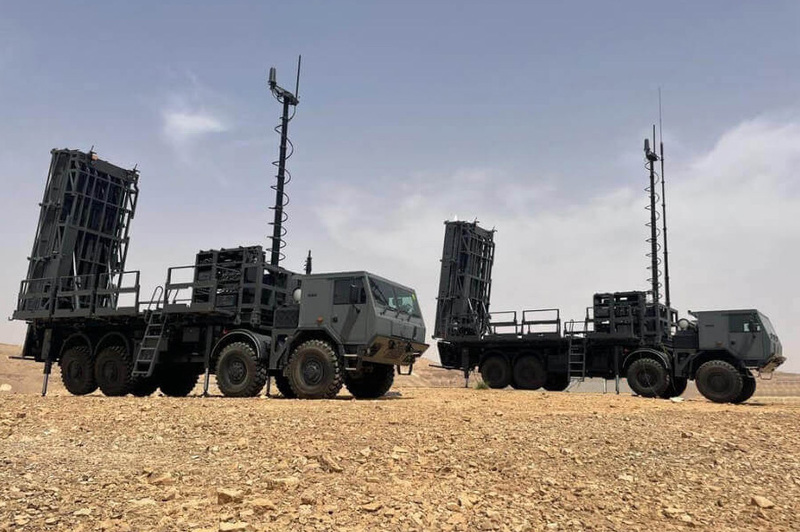 Picture: Czech Army to receive four batteries of SPYDER anti-aircraft missile system by 2026 | Rafael
Picture: Czech Army to receive four batteries of SPYDER anti-aircraft missile system by 2026 | Rafael
Israel is also a space industry that has supplied the Israeli army with reconnaissance satellites. Should not the Czech Republic also have such a space system, and why not in cooperation with Israel?
As President of ČISOK, I say that if we have a military reconnaissance satellite, it should definitely be in cooperation with Israel. We have a tradition in this field, we have people who know satellites. Israel's achievements in this field are spectacular. A combination of Czech and Israeli technology would be sensational.
You are also a patron and a great supporter of Czech culture. You founded the Bohemian Heritage Fund to help finance it. So let's close this conversation, which is mainly about security, with a question: Should we learn from Israel in culture or should they learn from us?
Let me say first of all that entertainment cannot replace culture. We cannot live without cultural stimuli in the long term. Czech cultural policy is completely different from Israeli cultural policy. We have a huge and permanent cultural offer. You realise this when you come abroad and the nearest theatre, ballet or opera house is thousands of kilometres away. There is a sea of cultures in Israel because of the diversity of the countries from which its inhabitants came. But the system of cultural support that we have in the Czech Republic is something that we could partially transfer to Israel.
JUDr. Pavel Smutný
Pavel Smutný is one of the three founders of the law firm CÍSAŘ, ČEŠKA, SMUTNÝ, which ranks among the largest law firms in the country. Since 2009 he has been the President of the Czech-Israeli Joint Chamber of Commerce, which promotes mutual trade between the two countries and develops scientific research projects. In 2011, he founded the Arnošt Lustig Award, which is given by the Chamber for demonstrating the values of Courage and Bravery, Humanity and Justice. Among its laureates, for example, is the current Chief of the General Staff Karel Rehka. Pavel Smutný is also a leading Czech philanthropist and President of the BOHEMIAN HERITAGE FUND, which supports Czech culture and artists.
He graduated from the Faculty of Law of Charles University in Prague and completed a study internship at the Sorbonne in Paris. In the past, he also worked as an expert in the OECD New Democracies Programme. His long-standing law practice focuses on international investment relations and commercial law.
Pavel Smutný is a recipient of the Medal of Merit, 1st Class, in particular for his support of relations between the Czech Republic and the State of Israel, and in 2017 he received the insignia of Knight of the French Order of Arts and Letters, an award for the sustained promotion and dissemination of French culture and the protection of national cultural heritage and monuments. In 2023, he received the prestigious Jerusalem Award, given by the International Zionist Organization and the City of Jerusalem for his longstanding support of the State of Israel.











